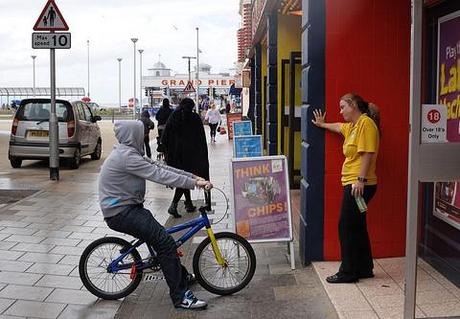
Youths in Britain: Photocredit: boliston http://www.flickr.com/photos/boliston/5812669710/sizes/m/in/photostream/
It’s not good news for the young (those between 18 and 24): youth unemployment (in Britain) is at its highest level since 1994, standing now at 991,000. Cuts in state spending have got rid of 300,000 jobs in the public sector; the economy is (once more) wobbling on the knife edge of recession. The total rise in unemployment has made the figure reach 2.57 million (the highest it’s been for nearly 20 years) – which the government has blamed on the global financial crisis. Practically all the national newspapers are unified in their stance.
Focus on British jobs. In a leading article The Daily Express calls it a “national tragedy” and a “national emergency.” We should now pursue every “feasible measure”, even if that means suspension of the minimum wage for the young, and stopping EU workers gaining “entry-level positions.”
What does David Cameron know? Also in its leader, The Mirror focused on the fact that David Cameron doesn’t understand “the misery of unemployment,” and he “richly deserves all the criticism heading his way.”
Pull up your sleeves. What’s concerning is the government’s “lacklustre” response, said The Independent’s leader. There is a strong case for not reining in spending cuts, and thereby not jeopardising interest rates. Though the unemployment level is still lower than the US and a lot of Europe, to blame the eurozone crisis is “an abdication of governmental responsibility.” Young people without jobs often never recover. The government should be investing in infrastructure and public housing; apprenticeships, internships and training. The government’s looking complacent: “It is time to show some initiative.”
We need to be convinced. In its editorial The Times agreed that the government should stick to its deficit reduction plan – relaxing would only bring “a modest boost”. But George Osborne, the Chancellor, does have “room to play with”. The governnment must introduce a “convincing update”, and focus on the young.
Things can only get better? The figures, said Daniel Knowles (himself a recent graduate) on The Daily Telegraph, don’t even take into account those young people at university getting the sort of education “barely worth the cost of freshers’ week drinks.” Graduates this year are coming up against those who graduated even four years ago, who have “accumulated experience” that “fresh graduates” can’t match. The “plague of internships” – let’s face it, we should call it “working for free” – is spreading; rents are going up too. Only the “very wealthy” can look for jobs in London. And what about those without degrees? A year ago, it seemed that “things were getting better for the young. Now I am not so sure.”
So what can we do? There is a solution, said Martin Bright on The Spectator blog. It’s called the Work Programme. It aims to get charities to reach the most difficult parts of society. It has its problems – but for “the government, the Work Programme must work. It has staked everything on it. For the millions on the dole there is no alternative. We are all in this together.”
More on unemployment and youth
- Hallmark hawks unemployment cards
- Somalis give guns to children
- Forest boy: Hero or hapless?

